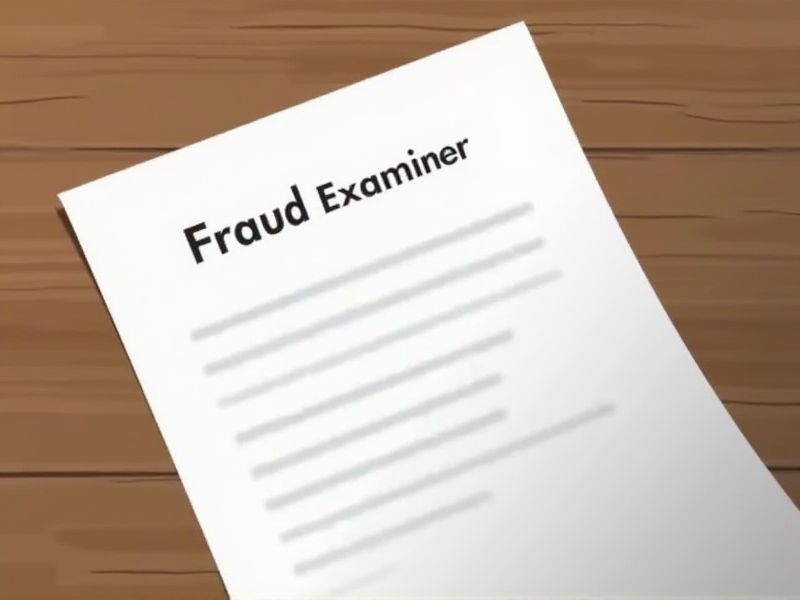
Fraud examiners operate in a complex environment that requires a deep understanding of financial systems, which is why certain certifications are crucial. These certifications provide standardized knowledge and skills that enhance the examiner's ability to detect and prevent fraudulent activities effectively. They validate expertise and credibility, facilitating career advancement and earning trust in the industry. Key certifications essential for a fraud examiner include the following.
Certified Fraud Examiner (CFE)
Fraud continues to evolve in complexity, necessitating expertise and specialization that a Certified Fraud Examiner (CFE) provides. The rigorous training CFEs undergo equips them with advanced skills in fraud detection and prevention, crucial for safeguarding organizational assets. Legal and regulatory environments demand adherence to standards, which CFEs are specifically trained to navigate. Data indicates companies with CFEs on board experience lower instances of fraud due to their proactive identification of vulnerabilities.
Certified Public Accountant (CPA)
CPA credentials provide a strong foundation in accounting principles, crucial for identifying discrepancies in financial records. A CPA's expertise in auditing helps in systematically examining financial statements for accuracy and compliance. CPAs possess a deep understanding of internal controls, which aids in detecting weaknesses that could lead to fraudulent activities. Their ethical training builds trust in their evaluations, ensuring objectivity and credibility in fraud examinations.
Certified in Financial Forensics (CFF)
Certified in Financial Forensics (CFF) expands a fraud examiner's competency in handling complex financial investigations by personalizing skills in forensic accounting. Enhanced expertise in areas such as asset misappropriation and fraudulent financial reporting increases the effectiveness of uncovering hidden financial malpractices. Holders of the CFF designation gain credibility among peers and employers, translating into greater trust during litigation or audit processes. The designation equips professionals with knowledge of the latest methodologies and standards critical for navigating contemporary financial crimes.
Certified Forensic Accountant (Cr.FA)
Certified Forensic Accountants (Cr.FA) possess specialized skills to detect and investigate financial anomalies that may indicate fraud. Their expertise in analyzing complex financial data ensures that organizations can identify fraudulent activities more effectively. The presence of a Cr.FA enhances the credibility of the fraud examination process in both legal and regulatory environments. Companies benefit from their insights by implementing stronger internal controls and fraud prevention strategies.
Certified Compliance & Ethics Professional (CCEP)
A Certified Compliance & Ethics Professional (CCEP) is crucial for a fraud examiner due to their extensive knowledge of regulatory standards, which helps prevent legal issues. Their expertise in identifying ethical breaches supports the creation of robust fraud detection systems. They ensure that internal policies align with laws, aiding in fraud risk mitigation. By fostering a culture of compliance, CCEPs contribute to a proactive approach in identifying and addressing fraudulent activities.
Certified Financial Crime Specialist (CFCS)
Certified Financial Crime Specialists (CFCS) possess specialized knowledge in areas such as money laundering, corruption, and fraud, which enhances their ability to detect and analyze complex financial crimes. Rigorous training and a standardized examination ensure that CFCS professionals consistently meet high industry standards, providing confidence in their investigative capabilities. In the ever-evolving landscape of financial crime, CFCS certification equips fraud examiners with the latest techniques and tools, crucial for staying ahead of sophisticated criminal schemes. Employers and stakeholders value the CFCS designation as it signifies a comprehensive understanding of global financial crime regulations and practices.
Certified Anti-Money Laundering Specialist (CAMS)
The Certified Anti-Money Laundering Specialist (CAMS) designation equips fraud examiners with specialized knowledge to identify complex money laundering schemes, strengthening their investigative skills. Money laundering activities often serve as a critical component of fraudulent operations, making CAMS expertise crucial for comprehensive analysis. With CAMS training, fraud examiners gain insights into current regulatory requirements, enhancing compliance measures and reducing legal risks. CAMS certification broadens a fraud examiner's understanding of international financial systems, enabling them to uncover cross-border fraud networks more effectively.
Certified Information Systems Auditor (CISA)
Certified Information Systems Auditor (CISA) certification equips fraud examiners with essential knowledge in assessing an organization's information systems. Possessing CISA helps in identifying control weaknesses that could facilitate fraudulent activities. The certification's emphasis on IT audit processes aids in the detection of anomalies that might indicate fraudulent behavior. Organizations value CISA-certified professionals because they bridge the gap between IT systems and financial oversight, enhancing fraud prevention strategies.
Certified Risk Management Professional (CRMP)
The CRMP credential provides structured risk management knowledge, helping fraud examiners identify and mitigate potential risks effectively. It equips professionals with strategic frameworks to systematically detect vulnerabilities, thus enhancing fraud prevention strategies. Known for its rigorous standards, the CRMP ensures examiners develop critical skills required for thorough risk assessments. By understanding comprehensive risk processes, certified fraud examiners can implement more effective controls and enhance organizational resilience.
Certified Professional Investigator (CPI)
Fraud examination demands specialized skills, and a Certified Professional Investigator (CPI) brings expertise in investigative techniques. Employers face risks from complex fraudulent schemes, and CPIs help mitigate these by providing credible evidence and insights. Regulatory bodies often require thorough, professional investigations, making a CPI essential for compliance and legal standards. Organizations also benefit from a CPI's ability to enhance internal controls and prevent future fraudulent activities.
Summary
When you obtain certifications as a fraud examiner, your credibility in the field significantly enhances. This recognition often leads to increased career opportunities and higher earning potential. Certified professionals typically demonstrate more effective fraud detection and prevention skills. Organizations highly value certified fraud examiners, which often results in better job security.
